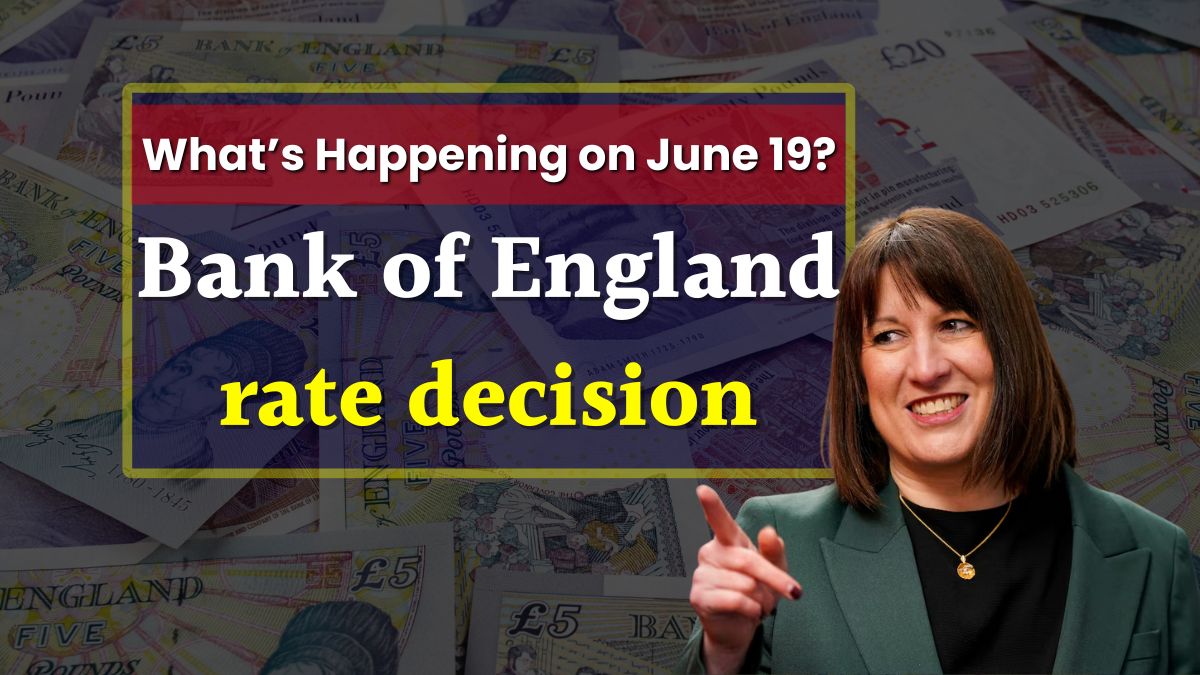If you’ve been feeling the weight of rising bills, loan repayments, or mortgage interest—you’re not alone. So many people across the UK are holding their breath, wondering: Will the Bank of England finally bring more relief this month? Or are we in for another long stretch of high interest rates?
Here’s what you really need to know before the big decision on June 19.
What’s Happening on June 19?
The Bank of England is set to make its next big move on interest rates. Right now, rates sit at 4.25%, following a small cut back in May.
Many people are hoping for another drop. But here’s the hard truth: most experts believe the Bank will hold steady this time.
Why No Rate Cut This Month?
A few key reasons:
- Inflation is still high – The April numbers showed 3.4% inflation, way above the Bank’s 2% target.
- May inflation data (released June 18) is expected to stay at 3.4%, which doesn’t give much reason to cut again.
- Wages and service prices are still climbing, making inflation sticky.
- Global tensions and economic uncertainty are keeping policymakers cautious.
Even though the UK economy contracted in April, the Bank doesn’t want to cut too soon and risk fueling inflation all over again.
When Might Rates Drop Again?
According to current forecasts, the next possible rate cut could happen in August—if inflation cools and the economy shows more signs of weakness.
Read Also: Worried About the UK Economy: Why the Bank of England Might Not Cut Interest Rates Yet
Upcoming Key Dates to Watch:
| Date | What’s Happening |
|---|---|
| June 19 | Bank of England rate decision |
| July 17 | New inflation data |
| Aug 7 | Next BoE meeting (possible rate cut) |
| Sep 18 | Policy review + potential move |
| Nov 6 | Likely second rate cut (if trends continue) |
| Dec 18 | Final meeting of 2025 |
Why This Matters to You
You might be thinking: Why should I care about interest rates?
Here’s how this affects your everyday life:
- Mortgage or rent payments: If rates stay high, variable mortgage holders may keep paying more.
- Credit card and loan interest: Borrowing remains expensive for families already struggling with debt.
- Savings accounts: You might see slightly better returns—but it’s not always enough to beat inflation.
- Business loans: Small business owners may find it harder to access affordable credit.
What the Experts Are Saying
Not everyone agrees on what’s coming next.
- Zara Noakes (JP Morgan): “We need solid proof inflation is cooling before the Bank can make another move.”
- George Brown (Schroders): “The Bank may not have as much room to cut as markets think.”
- Alan Taylor (Monetary Policy Committee): Pushed for a bigger cut last time, worried about the UK’s economic slowdown.
There’s tension inside the Bank itself. In May’s vote, members were split. Some pushed for a 0.5% cut, while others wanted to keep rates higher.
What You Can Do Right Now
If you’re feeling stuck in this financial rollercoaster, here are a few things that might help:
- Check your mortgage terms – Could you lock in a fixed rate before August?
- Review debt repayments – Look into consolidating or refinancing if you’re paying high interest.
- Build an emergency fund – If you can, even small amounts help buffer you against rising costs.
- Stay informed – June 18 inflation data and the June 19 decision are key.
FAQ
1. Will the Bank of England cut rates on June 19?
Probably not. Most analysts believe rates will hold at 4.25%, especially if May’s inflation stays at 3.4%.
2. When could the next rate cut happen?
If inflation starts to fall, we may see a cut in August and possibly another in November.
3. What happens if the Bank doesn’t cut rates?
Borrowing stays expensive, and it could put more pressure on households with debt or variable mortgages.
4. Why is the Bank being cautious?
Because inflation is still well above their target. Cutting rates too soon could make it worse.
5. How do interest rate changes affect savings?
Higher rates might mean better returns on savings—but with high inflation, your money’s buying power still shrinks.
6. Is the UK heading into a recession?
The economy shrank in April, which is worrying. But a lot depends on how inflation and global risks play out over the next few months.



